This article is Part 2 in a real-time series about raising a guide dog. Also read Adventures in Raising a Guide Dog, Part 1, Part 3, and Part 4.
In the summer of 2021, my husband and I volunteered to raise a puppy for an organization that provides guide dogs to people who are visually impaired or blind. We agreed it would be my project and a few weeks later we were given Lester, a 10-week-old black Labrador Retriever. She weighed 18 pounds, smelled like cookies, and was completely untrained.
I wrote about my first few months with Lester earlier this year. Here are some more notes from my puppy raising journal.
Lester turns eight months old in mid-April and easily transitions from puppy food to adult dog food and from three meals a day to two. Late that month, on a rainy weekday, my husband and I take Lester to the Baltimore Art Museum to see an art exhibit curated by the security guards. Because of the rain, the drive is three times as long as it should be, yet Lester remains in her place on the floor of the front passenger seat in a Zen-like state the entire time. It was only a few months ago that she either stood on the front seat or jumped into the back while barking non-stop every time we got in the car, so already the trip is a success. At the museum Lester keeps her eyes on me as we pause in front of each piece to take it in. Occasionally she sneaks glances at the colorful canvases until I give her the command to ‘stand’ so we can move on.
Any sort of focused activity will tire a puppy so although the ride back is even longer than the one going in, I do not worry about Lester. She falls asleep before we leave the parking lot and does not move the entire drive home.
It’s important for Lester to be comfortable using other forms of transportation, so I enlist a city-living friend to take us on a metro (or subway) ride. Lester and I drive to my friend’s house early one morning and the three of us walk a few blocks to the metro station. Lester keeps an eye on her surroundings and me while we buy our tickets, go through the automatic gate and ride the elevator to the platform. While we wait for our train, a visually impaired woman with a working guide dog walks down the platform. I see Lester notice the distraction, but she stays at my heel, as she is trained to do. When the working guide dog starts to move toward Lester, I wonder if I should tell the woman we are there, but before I decide the other dog falls back into position. When the train arrives, Lester walks aboard and as if by instinct and finds her place ‘under’ my legs once I sit down. She is both confident and curious as we ride several stops, disembark, and cross over to the platform to wait for a train to take us back to where we started.
Going to the grocery or hardware store is now routine for Lester, and she settles quickly in restaurants when my husband and I go out to eat. Lester spends most Wednesdays in the office with my sister-in-law and knows to find a place to relax when I do a yoga or exercise class at home, although she sometimes insists my yoga mat is the only comfortable spot for the naps she takes while I am using it.
On an early spring Saturday, I take Lester to a friend’s college lacrosse game. Between the cloudless sky, the metal bleachers and the artificial turf throwing off midday summer-like heat, I am concerned Lester (and I!) will have trouble settling in for the three hours we will be there. After a short while the sun becomes unbearable, so we move and watch the second half of the game sitting in the shade on a grassy spot behind one of the goals. Lester seems to enjoy the game, or maybe she just likes being outside for the entire afternoon, and I am doubly proud of the way she ignores the myriad pet dogs that other fans parade by us on their way to and from the bleachers.
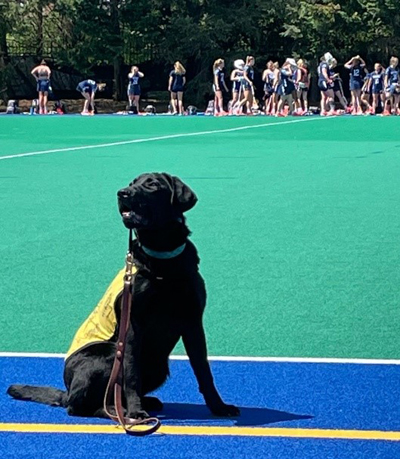
Later that month Lester and I go to our regular puppy class at a local mall. There is an art exhibit down the middle of the already narrow walkways, which makes the space feel cramped and crowded. From the moment we arrive Lester is agitated, nervous, and impossible to calm. I always feel performance pressure at class, and my anxiety level climbs by the minute. I know dogs feel what we feel and it’s critical to stay relaxed so they will stay relaxed, but even the instructor has trouble calming Lester. Halfway through class I take Lester outside to get some air and reset, but that doesn’t work either.
“How old is she?” the instructor asks when we rejoin the class.
“Eight-and-a-half months,” I reply.
“This could be hormones,” she says.
“Isn’t that early? I thought these dogs usually go into heat around eleven or twelve months.”
The instructor shrugs. “It’s a possibility. It would explain a lot.”
The next several days Lester is possessed by a poltergeist. She barks at random times and objects. She finds an LL Bean catalog on our coffee table and shreds it like she is exacting revenge. She paces when I put her in her crate and is clingy and nudgy when I let her out. I think I have lost my way and my ability to train and contain her. And then one Saturday morning, two weeks after that awful class, Lester goes into heat and the poltergeist disappears as quickly as it came.
We are required to stay home for the next four weeks, so we spend our time reviewing house manners and practicing basic obedience drills. I also arrange daily playdates for Lester so she can get rid of the energy that she would normally burn up in classes, on errands, and socializing with me. Luna and Bruce, two puppy pals from the neighborhood, are regulars. Chelsea, Deborah, and Alice, from the same program as Lester, are also frequent visitors – sometimes all at the same time. Most of the plants in the backyard are trampled to death by the playful pups. I am sure it will be bittersweet when we replace them next spring because Lester will (hopefully) not be here.
Toward the end of Lester’s quarantine her boyfriend Boomer, a gentle 12-year-old golden retriever who is our fairy god dog and for years has been a frequent houseguest, comes to stay for the last time. He and his person are moving to Florida at the end of the following month. Boomer and Lester are particularly affectionate that visit – as if they know – always sitting or lying near each other, cuddling and falling asleep with their paws or legs overlapping.
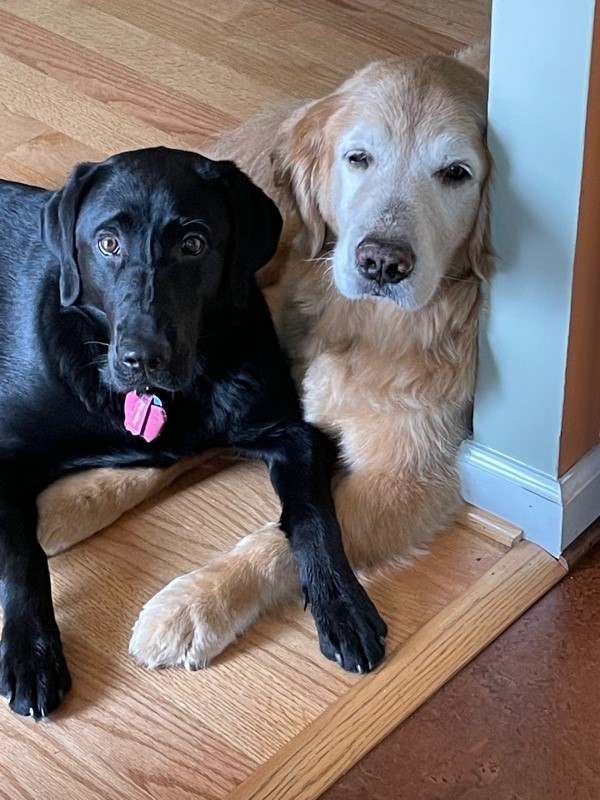
When Boomer leaves at the end of the week, saying goodbye feels like a rehearsal for when I will have to say goodbye to Lester, which is only a matter of months from now. I know Boomer is not mine, and neither is Lester, but saying goodbye to him is just as painful as if he were. For the first time, as Boomer and his person drive away, I think about the time Lester will leave for her formal guide dog training, and I let myself cry. Lester mopes the rest of that day and the next, so I take her to play with her favorite dog pals, my brother’s dogs Mack and Phil, to try to cheer her up. When we return home, Lester bursts into the house and runs into every room, no doubt looking for Boomer, before curling up in a dark corner by the front door. Perhaps she also feels the ache of goodbye.
As spring turns to summer, we spend less time learning new house manners and skills and more time finessing the ones she knows. Sometimes Lester is so eager to do what I ask that she spins through every command she knows well, like ‘sit’ ‘down’ and ‘place’ as I try to teach or reinforce trickier ones like ‘stand’ and ‘heel.’ I would find it frustrating if it weren’t so funny, so I laugh, take a deep breath, and begin again.
Errands, appointments, and field trips are more enjoyable now that Lester knows how to behave, and I relax knowing that she will. When we struggle with a behavior (the way she barks when someone comes to the door or when she hears a neighborhood dog bark) I know it is because of my shortcomings as an amateur trainer. After I try my best, I reach out to one of the group instructors for help and am grateful to have a new strategy or two to implement. It helps when my husband reminds me that there is a reason why we will have Lester for close to a year-and-a-half – a puppy needs that time to get ready for their formal guide dog training.
On a hot Sunday in August, we are invited to a pool party at the house of a long-time puppy raiser. Mack and Phil already showed Lester how to swim in a shallow creek down the street from us, but this will be her first time in an open pool. When we arrive, I put a life vest on Lester to give her a little confidence and to give me peace of mind that she won’t panic or sink. At first, she and several other dogs run around the pool, looking at the water and the toys floating just a little too far for them to reach. After a few minutes I grab hold of the handle of Lester’s vest and walk her down the broad steps of the pool before I let her go where the water is too deep for her to stand. Lester immediately starts to swim, capturing and carrying the various toys in her mouth as she paddles from one end of the pool to the other over and over again. She swims past me, pulls herself out and dives back in for almost two hours. The entire time her face beams with joy, which instantly makes this my favorite day ever with her.
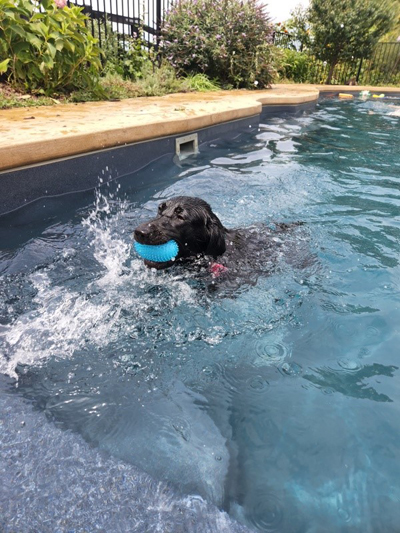
Our biggest adventure comes by complete surprise. Boomer’s person calls to say he is going to a wedding in mid-September; would we like to come to Florida to stay with Boomer during that time? We jump at the chance to spend time with Boomer and give Lester the experience of flying in an airplane, something her forever person might want or need to do.
The day we travel could not go any better. From the cab ride to the airport straight through check-in, security, and boarding the plane, Lester behaves as though she has flown a hundred times and wants to show us how it is done. She instinctively knows to find her place under the seats in front of us and sleeps through most of the flight. It is only when the landing gear comes down that she pops her head up for some reassurance. Our flight home was a little bumpy, but we keep Lester (and ourselves) calm and have another positive experience from beginning to end.
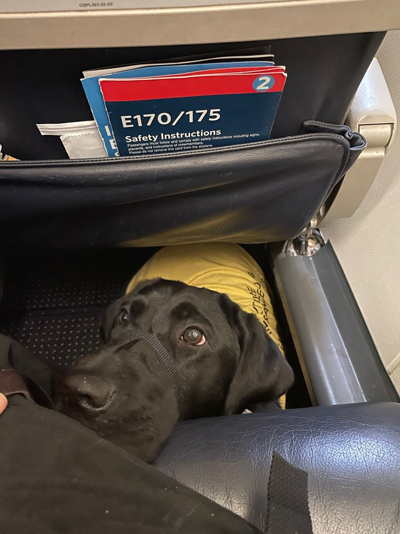
As I write this, Lester is recovering from spay surgery. The operation went well but the tricky part is keeping her quiet and calm for the two weeks the vet requires to ensure she heals 100 percent. The weather is nice enough for her to be on the back porch during the day, and I see her staring out at our fenced-in yard, no doubt longing to be zooming around with one of her pals.
Lester is nearly 14 months old, and I am so proud of how far she’s come from the untrained puppy I was handed almost a year ago. The time we have together feels like it is speeding up, and I am at once happy for her and sad for me that she may be going in for her formal training in just a few short months.
Become a Saturday Evening Post member and enjoy unlimited access. Subscribe now
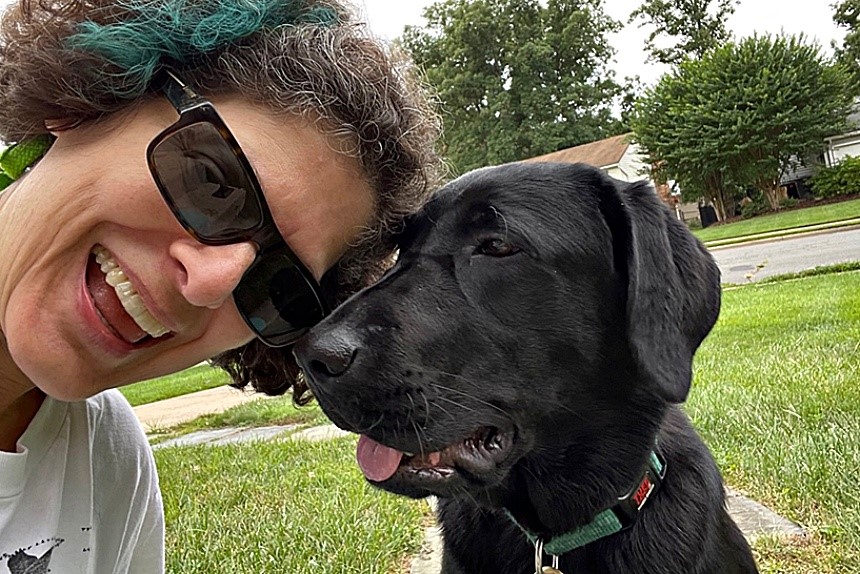

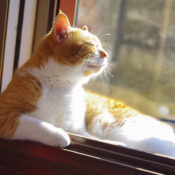

Comments
Hello again, Bob,
Thank you for your lovely note (and for reading my essay!). Raising Lester has been one of the most challenging and rewarding experiences I have had. I got lucky – she is very smart and a quick learner. Not all puppies are. So she has certainly helped me along every step of the way.
One of my goals has been to somehow balance teaching Lester to be a working dog and allowing her to have fun and just be a puppy. I love that she loves to swim because she might be around water – a pool, a lake, the ocean – with her forever person. And…if Lester did not know how to swim and accidentally found herself in the water, her visually impaired partner might not notice or be able to save her.
I won’t have any say in where she goes or who she gets paired with. That will be up to the organization she belongs to and, in some ways, Lester. I also hope I will get updates from her forever person, but alas, that will be up to them. I am trying to make the most of our time together so I will have all the memories I need to keep her with me even when she is not. Thank you again, Devra
I’m impressed with how far Lester’s come in the past 6 months, Devra. Planes, trains, automobiles, cabs, subways, stores, restaurants and the swimming pool! She loves that pool. Me too—it’s the best! Very glad you and she didn’t get overcome by the heat at that lacrosse game last spring.
It seems like she’s really overcoming temptations to want to have fun when she’s ‘on the job’ but gets plenty of outlets with her dog pals Boomer, Luna, Bruce, Chelsea, Deborah, Alice & Mack and Phil. I almost got to attend a 2nd dog wedding, but it was cancelled due to unfounded Covid fears. Fortunately the first one was several years ago between bride and groom Basset hounds, because it looks like Covid’s ruination of everything is here to stay.
Lester’s doing amazingly well because YOU’RE doing such a wonderful job with her, every step of the way. I hope you have some say in which home she goes to. It has to have a pool. That’s a must, but let us know. You probably won’t be able to see her again once she’s assigned which is understandable, but pictures and videos? I hope so!